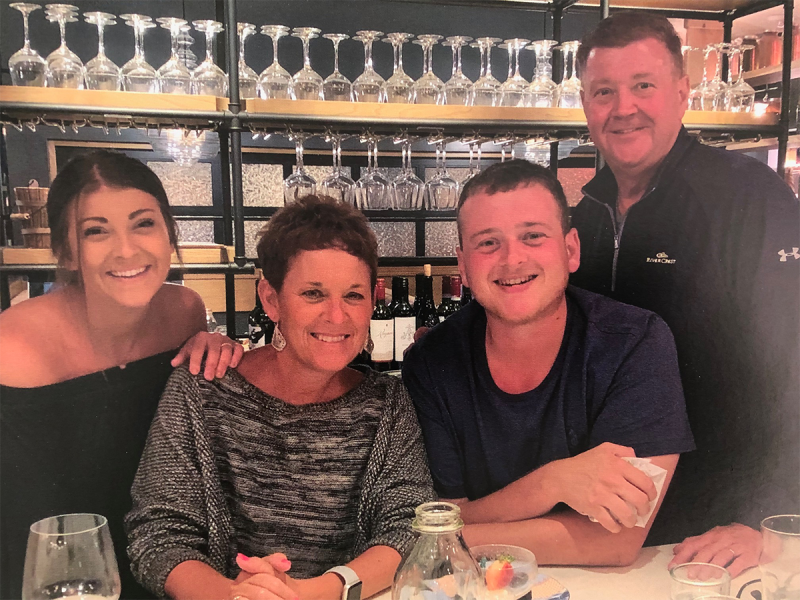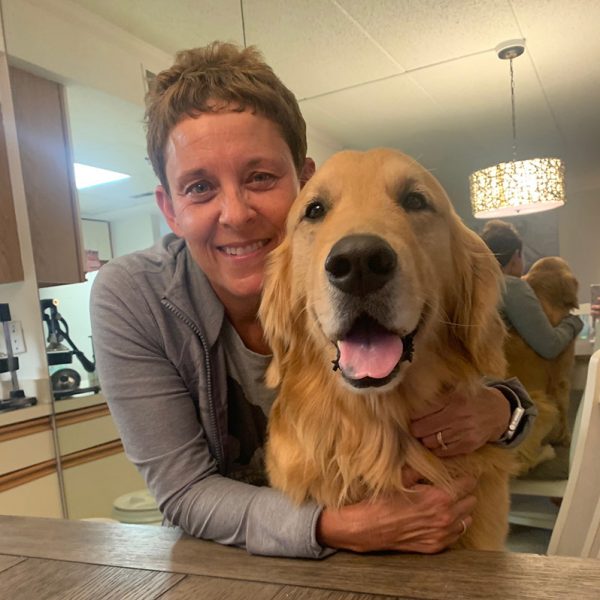Mother and Daughter Model Virtues During Covid-19 Pandemic
By Hoyt Smith
Editor's Note: In light of Covid 19, we are paying tribute to all essential workers. Marcia is our co-owner Marc Menkin's twin sister. Pictured are Marcia's son Ryan, husband Barry and daughter Carly.

Equipped with virtues, we can turn the most trying experiences into teachable moments.
With the Covid-19 pandemic, these past months have been full of trying experiences. We recently asked how people are and aren’t coping and discovered a mother and daughter in Pennsylvania with an inspiring tale of caring, courage, helpfulness, service and steadfastness.
Marcia is the mom. She’s a physician’s assistant who works with elderly patients in nursing homes Carly is the daughter. She is a pharmaceutical sales representative living at home with her parents.
Covid-19 has hit nursing homes hard. “It’s been awful, spreading like wildfire,” says Marcia. No visitors have been allowed in her facilities since March. The only human interaction Marcia’s patients have had has been with their caretakers.
Marcia has been working with senior citizens for 30 years and loves her job, but she says there has been an emotional toll lately. When her patients are in quarantine, there’s no pill to cure the loneliness or isolation. When they’re sick especially, many cry out in vain for family members.
“When the pandemic first started, it was overwhelming,” says Marcia. “There were many days where I would sit in my car after work and cry – and I’ve got to say, few things rattle me.”
As upsetting as the situation was, Marcia remained committed to her work. Then, in addition to her patients, Marcia’s colleagues started getting sick. A doctor caught the virus, and then a family nurse practitioner. “A lot of caregivers were getting it, including a nurse who ended up on a ventilator for three weeks,” Marcia adds. “It was pretty bad.”
As the outbreak spread, there wasn’t enough personal protective equipment (PPE) to go around. Some care givers wore the same mask and gown for weeks. Staffing issues developed at the nursing homes. Several nurses quit because they were scared. “We were really short staffed and under-equipped,” Marcia says. “I don’t know how we held things together.”
Marcia wasn’t facing financial hardships at the time. She didn’t have to come to work and risk her life in order to pay the bills. Her husband is a dentist, their children are grown and they have built equity in their home over the years. But the physician assistant felt obligations to her patients and her colleagues. “It’s my job to take care of these sick people,” she says. In spite of the challenges, she refused to quit.
Then, on Mothers Day, Sunday, May 10, Marcia started feeling lousy. As she stood in line for take-out food that evening, her legs ached so much that she had to sit down. Later she didn’t sleep well. On Monday she went to work, but by the end of the day, Marcia was overtaken with body aches and fever.
“I was pretty sick, with a dry cough and a headache,” she says. “I wasn’t surprised with the diagnosis. I was sure I had it, so my husband drove me to get tested. I was never really worried about myself though. My concern at that point was for him and the kids.”
Marcia’s husband and both of her children tested negative. Carly says she was frightened, but insisted upon remaining with her mother through the entire course of the illness.
“I’d been working from home because of the pandemic, so I obviously wasn’t going anywhere,” she adds. “It was difficult trying to help my mom without catching the virus, but I was least concerned about myself. I’m 23 years old and healthy.”
 In addition to her mom, Carly was concerned about her dad. He was at greater risk than she was, and Carly didn’t want to place him in any more danger than necessary. So she was the one checking in, taking Marcia’s temperature five times a day, preparing meals, washing linens and constantly wiping everything down.
In addition to her mom, Carly was concerned about her dad. He was at greater risk than she was, and Carly didn’t want to place him in any more danger than necessary. So she was the one checking in, taking Marcia’s temperature five times a day, preparing meals, washing linens and constantly wiping everything down.
“She was great,” Marcia says, referring to Carly. “She kept the whole house disinfected.”
“I felt like that’s what I needed to do,” she says. “It was exhausting. I still had to my work to do from 9 to 6. But my mom and I are best friends. We’re very close and I think I have that same caregiving gene she has.”
Marcia’s continuous headaches were a major concern. She was in excruciating pain for days at a time and Carly repeatedly asked, “Do you need to go to the hospital?” But the respiratory issues were what scared Marcia’s daughter me the most. “The fevers we could deal with,” she says, “Fortunately she was breathing ok.”
Although she lost her sense of taste and smell for a while, Marcia’s appetite gradually returned. With proper care and rest, she recovered in about three weeks. The entire Foster family continued to get tested and retested. After Two negatives and the assurance that no one else in the house had contracted the coronavirus, Marcia finally returned to work.
“I felt guilty being out so long,” she says. Some of her other infected healthcare colleagues however were out five or six weeks with the coronavirus. The disease affects everyone differently. Marcia says one recovering nurse is still suffering from chronic fatigue.
There are many like Marcia who will risk their lives to support workplace colleagues and do what they do best. It’s not about the money, or even the professional pride. What happens though, when selfless acts of valor place others at risk – particularly those we love the most?
When family members fall sick, some will step up and become care givers while others are better served by distancing themselves and playing it safe. Caring for someone at home with Covid-19 may detract from earning an income, and it requires extra energy, patience and compassion. But again, there are costs and consequences for such choices, and some may pay the ultimate price.
We all weigh risks and rewards when we make decisions. The rational mind considers the costs and the benefits. But there are also virtues within all of us that guide our actions and the paths we take. They are often invisible influencers and we’re not consciously aware of their presence when we deliberate.
Acknowledging and embracing virtues on the other hand can help us all to be our best, especially when the choices are difficult in trying times like these. We wish Marcia, Carly and their family the best and thank them for sharing their experience during this pandemic.
